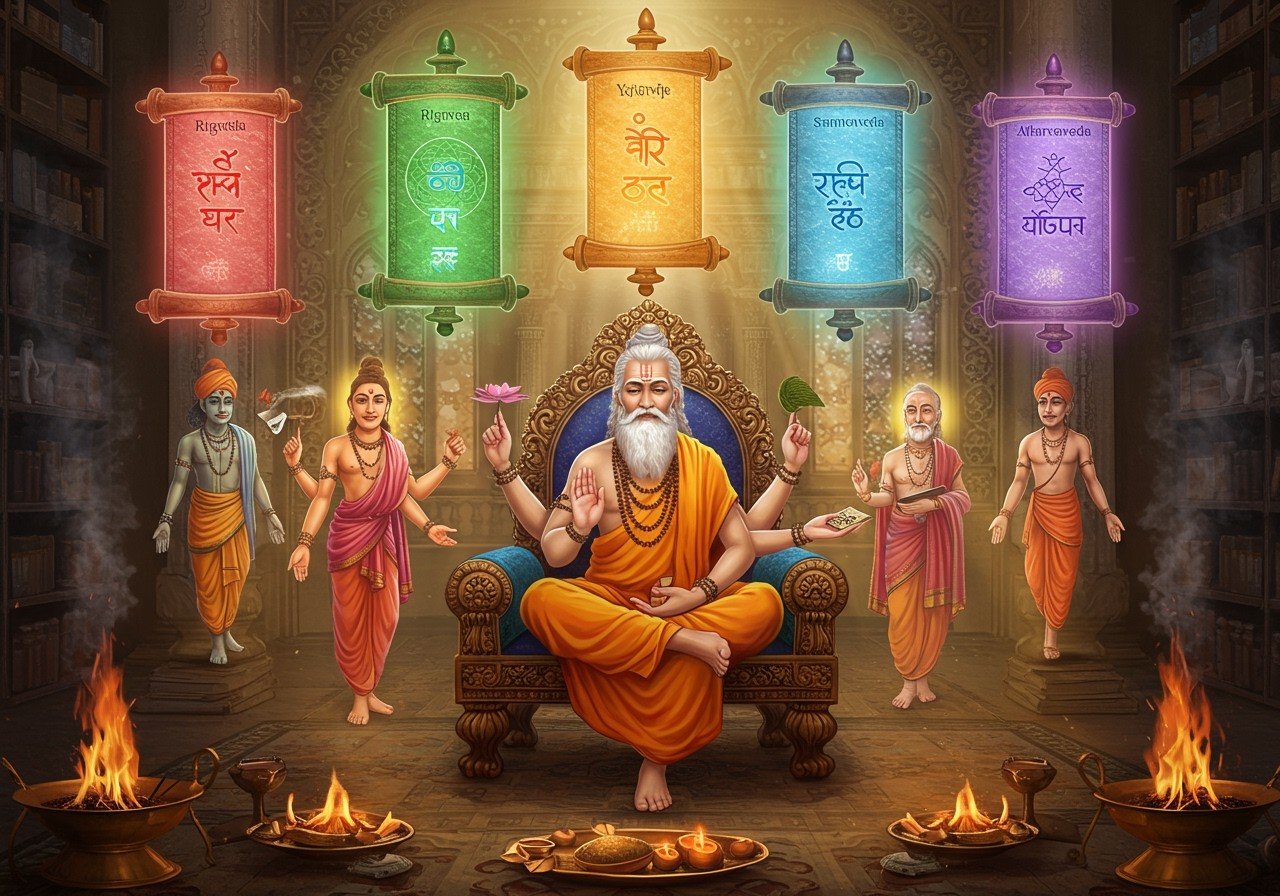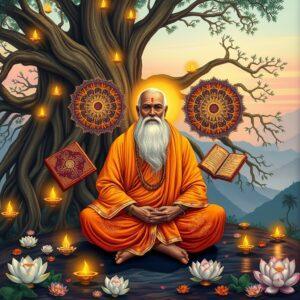
The Vedas, ancient sacred texts composed in Vedic Sanskrit, hold immense significance in Hindu philosophy, rituals, and daily life. Considered apauruṣeya, meaning “not of human origin,” they are believed to have been revealed to sages (Rishis) in deep meditation approximately 5,000 years ago and compiled by Vyasa. These scriptures form the cornerstone of Indian culture and spirituality, offering timeless wisdom and guidance. Understanding their origins, authorship, and classification helps preserve tradition while embracing their relevance in contemporary society.
Origins and Authorship
Composed during the Vedic period, roughly between 1500 BCE and 500 BCE, the Vedas were initially part of an oral tradition, meticulously passed down through generations before being transcribed. Rishis played a vital role in composing and preserving these texts, with Vyasa credited with their compilation. The Vedas are revered as divinely revealed, embodying profound spiritual insights.
Classification of the Vedas
The Vedas are classified into four main branches, each with its unique focus and purpose:
- Rigveda: A collection of hymns praising various deities, offering insights into the cosmos and the nature of reality. It’s considered the oldest Veda and a cornerstone of Hindu religious practice.
- Samaveda: Focusing on musical chants and melodies used in rituals, the Samaveda emphasizes the power of sound and vibration in spiritual practices. It draws heavily from the Rigveda, adapting its hymns for liturgical purposes.
- Yajurveda: This Veda provides instructions and prose mantras for performing rituals and sacrifices, outlining the precise procedures for various ceremonies. It offers a practical guide to Vedic ritualism.
- Atharvaveda: Containing a diverse collection of spells, charms, incantations, and philosophical insights, the Atharvaveda addresses practical concerns of daily life, including healing, protection, and prosperity.
Each Veda further comprises Samhitas (hymns), Brahmanas (ritual manuals), Aranyakas (forest treatises), and Upanishads (philosophical teachings), forming a comprehensive body of knowledge.
Historical Development and Compilation
The transition from oral tradition to written form marked a significant development in the preservation of the Vedas. Vyasa’s role in organizing and compiling these vast collections of knowledge is pivotal in Hindu tradition. The Puranas, ancient Hindu texts, provide historical context and narratives related to the Vedas, enriching our understanding of their development and transmission across generations.
Influence and Legacy
The Vedas have profoundly shaped Hindu philosophy, rituals, and daily life. Their influence extends to classical Indian literature, arts, and sciences. Vedic principles continue to resonate in contemporary spiritual practices and festivals, demonstrating their enduring relevance. The global recognition and scholarly study of the Vedas underscore their lasting impact on human thought and spirituality.
Explore more about Hindu rituals and traditions on Poojn.in: Hindu Rituals: A Guide to Coping with Grief and Loss. Discover the rich tapestry of Hindu beliefs and practices through informative articles and resources.
Preservation and Accessibility
Ongoing efforts to preserve Vedic manuscripts include digital archiving and translation projects, ensuring their accessibility for future generations. Institutions dedicated to Vedic scholarship promote research and studies, fostering a deeper understanding of these ancient texts. Modern initiatives make Vedic texts and commentaries available online, allowing a global audience to connect with this rich heritage. Discover more about the global reach of Hinduism: Hinduism’s Global Reach.
Poojn.in: Your Gateway to Vedic Traditions
Poojn.in, India’s leading cultural goods and services store, offers a wide selection of products to support your exploration of Vedic traditions. From puja items to authentic texts, we provide everything you need to connect with this ancient wisdom. Discover our collection of paddy seeds for puja, camphor, and sacred threads to enhance your spiritual practices.
FAQs about the Vedas
Who wrote the Vedas first? The Vedas are attributed to ancient Indian sages known as Rishis, who received divine inspiration.
Who classified the Vedas? Sage Vedavyasa is traditionally credited with compiling and classifying the four Vedas.
When were the Vedas written? The Vedas were originally transmitted orally before being written down around 1500 to 500 BCE.
What are the four Vedas? The four Vedas are Rigveda, Samaveda, Yajurveda, and Atharvaveda.
Why are the Vedas important? The Vedas are central to Hinduism, providing guidance on rituals, philosophy, and righteous living.
How were the Vedas preserved? Primarily through meticulous oral tradition, passed down through generations of scholars.
Are the Vedas still used today? Yes, they remain integral to Hindu rituals, ceremonies, and philosophical studies.
What language are the Vedas written in? Vedic Sanskrit, an ancient form of Sanskrit considered sacred in Hinduism.


